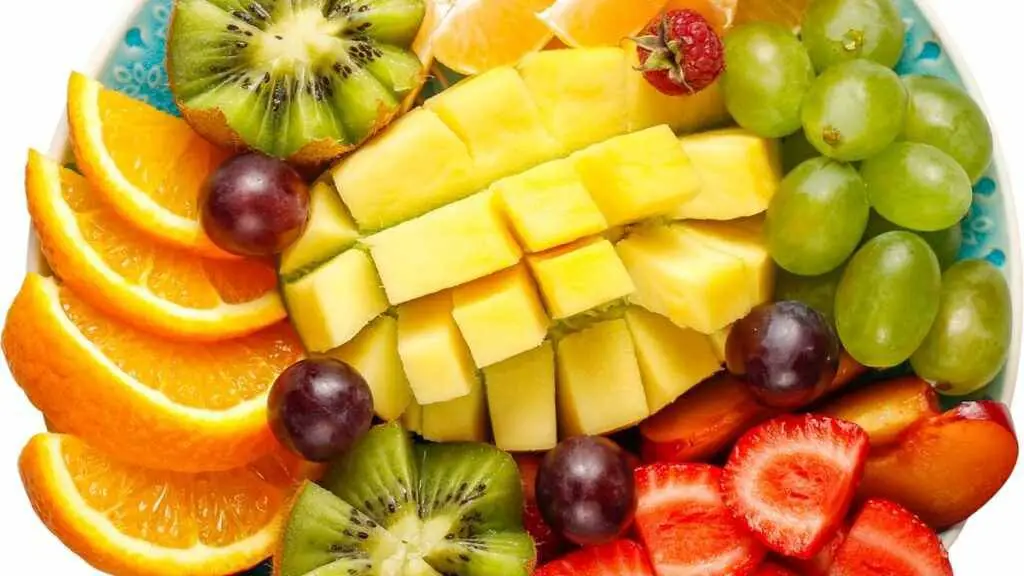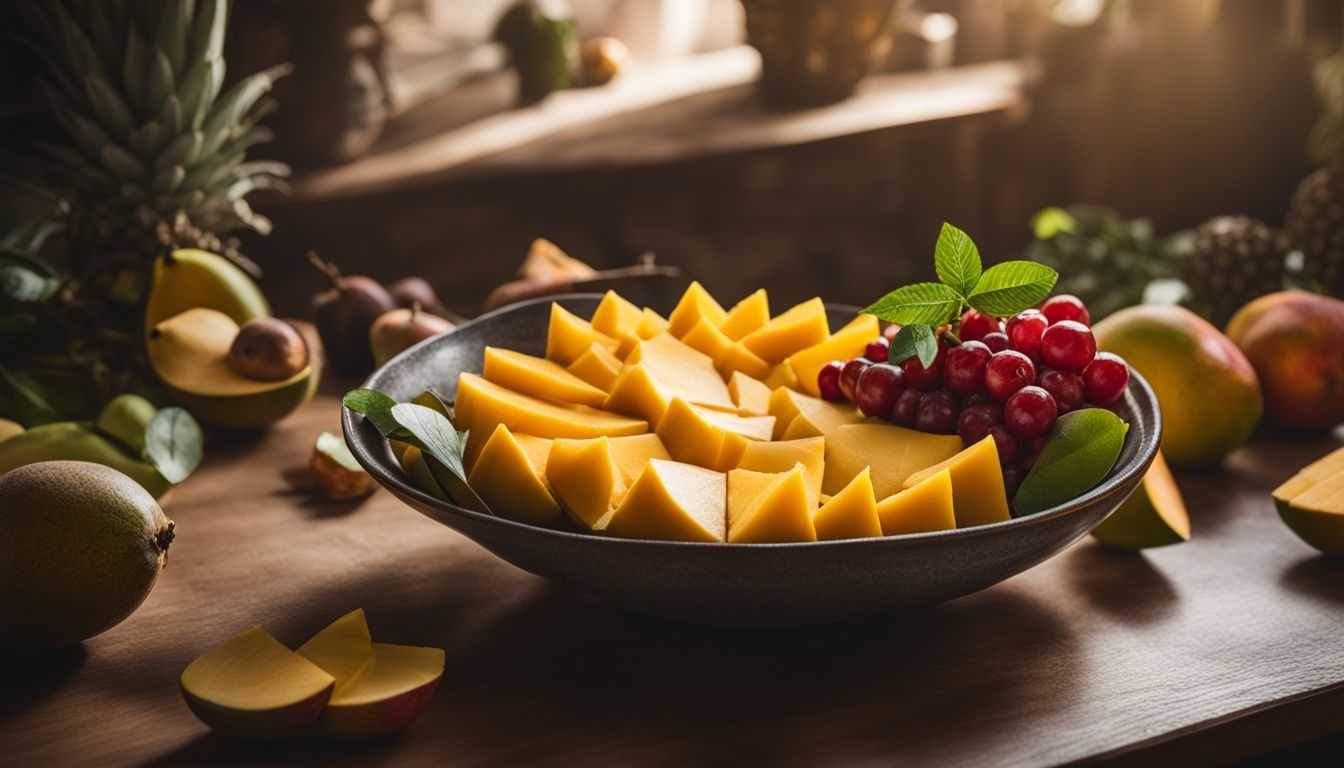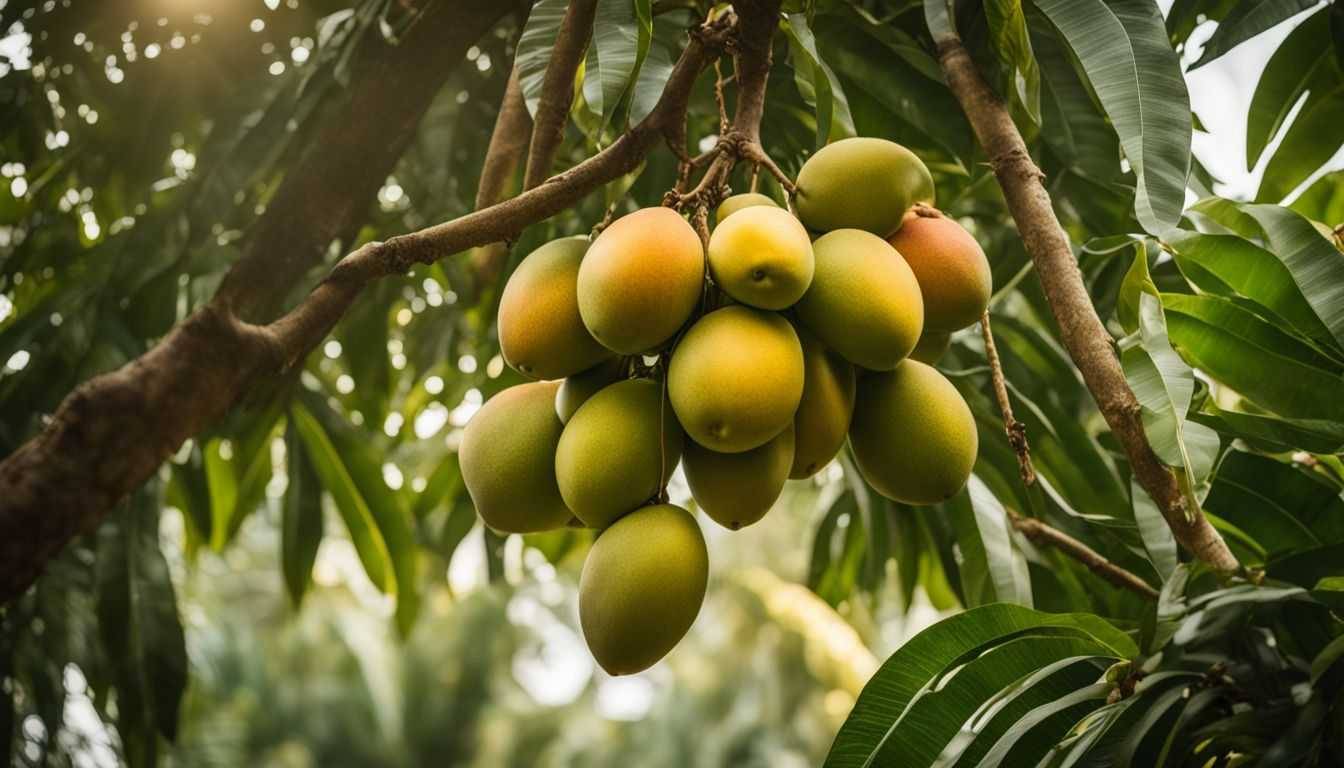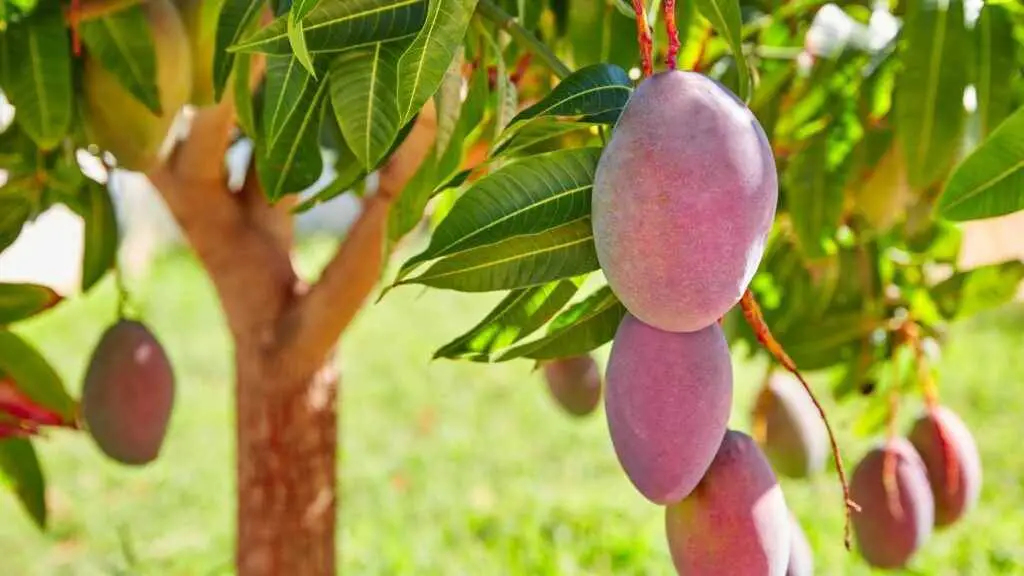Ever had the delight of biting into a lusciously ripe mango and thought – could this tropical treat actually be good for me too? The answer is a resounding yes! Many of us tend to overlook the health benefits packed in these sun-kissed fruits.
Mangoes, bursting with vitamins A, C, copper and a treasure trove of other nutrients, are more than just flavorful; they’ve been shown to promote everything from vision health to diabetes management.
Want some fascinating trivia on this delicious superfood? Join me as we journey together through the vibrant world of mangoes.
Key Takeaways
- Mango is a nutrient – packed superfruit that offers numerous health benefits.
- It is rich in vitamins A, C, and E, as well as minerals like copper and folate.
- Mango can aid in diabetes prevention and improve digestive health.
- It supports heart health, boosts the immune system, and promotes eye health.
- Mangoes may also lower the risk of certain cancers.
- They are low in calories, high in fiber, and can be beneficial for weight loss.
- Additionally, mangoes have skin and hair benefits due to their vitamin content.
Nutritional Profile of Mango

The nutritional profile of mango is impressive, making it a superfruit for individuals aiming to lead a healthy lifestyle. Below is a detailed table of the wealth of nutrients found in one cup of fresh mango:
| Nutrient | Amount |
|---|---|
| Calories | 99 |
| Protein | 1.4 grams |
| Carbs | 24.7 grams |
| Fat | 0.6 grams |
| Fiber | 2.6 grams |
| Vitamin C | 67% of the Daily Value |
| Copper | 20% of the Daily Value |
| Folate | 18% of the Daily Value |
| Vitamin B6 | 11.6% of the Daily Value |
| Vitamin A | 10% of the Daily Value |
| Vitamin E | 9.7% of the Daily Value |
| Vitamin K | 6% of the Daily Value |
This tropical fruit also contains useful amounts of other minerals and vitamins. It’s low in calories, making it a smart choice for those looking to manage their calorie intake. Furthermore, mango is high in antioxidants, thanks to the polyphenols like mangiferin it contains. So, without a doubt, mango deserves its place in our diet as a health-boosting superfruit.
Health Benefits of Mango
Mango is not only delicious, but it also offers a wide range of health benefits. It is rich in nutrients, low in calories, and can aid in preventing diabetes. Plus, it contains healthy plant compounds that support the immune system and heart health.
Additionally, mango improves digestive health, supports eye health, and may even lower the risk of certain cancers.
Rich in Nutrients
Mango is full of good stuff for our bodies. In one cup, we get vitamins like C, A, E, K and B6! These keep us healthy and make our bodies work right. Also in that cup are things called folate and copper.
They help us grow and keep our blood healthy.
That’s not all though! Mango also has protein, carbs, a little fat, and fiber. Our bodies need these to have energy and feel full. So next time you’re hungry for a snack or want something sweet after dinner – think about grabbing a mango instead! It’s tasty food that’s good for our health too.
Low Calorie Content
Mangoes are good for people who want to eat less calories. Only 99 calories are found in a cup of fresh mango. This low calorie content makes it easy to add mango to your menu, even if you’re trying to use fewer calories.
Mangoes fill you up and make you feel full longer which helps with weight control too! Eating this fruit can be a tasty way to keep your diet on track without adding lots of extra calories.
Can Aid in Diabetes Prevention
Mangoes are a great fruit to eat, especially if you’re worried about diabetes. They can help keep this health problem away. The fruit is full of things that are good for your body, like polyphenols and mangiferin.
These act as helpers in the fight against diseases. Not just in the fruit itself, but also in its leaves and skin, there are helpful bits that may lower blood sugar levels and your weight too! Both of these aid in keeping diabetes at bay.
So why not add more mangoes to your diet?.
Contains Healthy Plant Compounds
Mango contains a variety of healthy plant compounds that can benefit your overall health. One important compound found in mango is mangiferin, which acts as an antioxidant in the body.
Antioxidants help protect your cells from damage caused by harmful substances called free radicals. Mango also contains zeaxanthin, another powerful antioxidant that may promote eye health and prevent age-related macular degeneration.
These plant compounds contribute to the vibrant color of mangoes and offer various health benefits when included in your diet. So, by enjoying delicious mangoes, you’re not only satisfying your taste buds but also nourishing your body with these beneficial plant compounds.
Boosts Immune System
Mango is a superfruit that can boost our immune system. It contains important nutrients like vitamin A, vitamin C, copper, folate, and vitamin E. These nutrients play a vital role in supporting our immune system and keeping it strong.
Vitamin A helps in the production of white blood cells that fight against harmful bacteria and viruses. Vitamin C is known for its antioxidant properties which help protect our cells from damage caused by free radicals.
Copper is necessary for the proper functioning of our immune system, while folate helps produce new red blood cells and supports overall immunity. Lastly, vitamin E acts as an antioxidant and protects our cells from oxidative stress.
Mango also contains other plant compounds that have been shown to enhance immune function. These include polyphenols like mangiferin which have anti-inflammatory properties and can help strengthen our body’s defenses against infections.
Supports Heart Health
Mangoes are not only delicious, but they also offer some great health benefits. One of these benefits is that mangoes support heart health. How? Well, mangoes can actually help lower cholesterol and blood pressure levels, which are both important factors for a healthy heart.
They contain potassium, which is beneficial for the heart, and they also have an antioxidant called mangiferin that may support heart health. Plus, mangoes are a good source of magnesium, which is important for maintaining a healthy heart.
So next time you’re enjoying a juicy mango, know that it’s doing your heart some good too!
Improves Digestive Health

Mango is great for your digestive health because it has a lot of water and fiber. The digestive enzymes in mango can help make digestion better. It can even relieve constipation and diarrhea.
The high fiber content in mango helps you have regular bowel movements and keeps your digestive system healthy. Plus, mango is low in calories, so it’s good if you want to watch how many calories you eat but still keep your digestive health on track.
And don’t forget, mango has lots of vitamin C, which is important for a healthy digestive system!
Supports Eye Health
Mango is really good for our eyes. It has vitamin C, which helps keep our eyes healthy. Mango also has an antioxidant called zeaxanthin that protects our eyes from harmful blue light and vision problems.
Plus, mangoes have a lot of vitamin A, which is important for eye health. They also help with collagen production in the eyes, so they stay strong and healthy. So if you want to take care of your eyes, eating mango can be a great choice!
May Lower Risk of Certain Cancers
Mangoes are a delicious fruit that may help lower the risk of certain cancers. They contain a compound called mangiferin, which has been found to protect against lung, colon, breast, and neuronal cancers.
Additionally, mangoes are rich in beta carotene, which is known to have cancer-protective properties, particularly against skin cancer. The leaves and peel of mangoes also contain compounds that can reduce risk factors for diabetes, another condition associated with certain types of cancer.
By including mangoes in your diet, you can enjoy their sweet taste while potentially reducing your risk of developing these serious diseases.
How Mango Benefits Skin and Hair

Mangoes are not only delicious but also have several benefits for our skin and hair. The high content of vitamin A in mangoes helps in the growth and development of healthy skin and hair tissues.
Vitamin C, found abundantly in mangoes, supports collagen production, which is important for maintaining the elasticity and firmness of our skin and hair. Additionally, mangoes are packed with beta carotene, a compound that converts to vitamin A in our bodies and can protect against skin cancer.
Another reason why mangoes are great for our skin and hair is their potassium content. Potassium helps regulate water balance in cells, keeping our skin hydrated and preventing dryness.
Furthermore, the fiber and vitamins present in mangoes contribute to overall scalp health by nourishing the follicles and promoting strong hair growth.
So if you want to improve the health of your skin and hair naturally, consider including more mangoes in your diet. Whether you enjoy them as a snack or incorporate them into smoothies or salads, these nutrient-packed fruits can do wonders for your beauty routine!
Mango and Potential Weight Loss
If you’re looking to lose weight, mangoes can be a great addition to your diet. They are low in calories, with just 99 calories in one cup of fresh mango. This makes them a good choice for anyone trying to cut down on their calorie intake.
Mangoes are also high in fiber, which is important for weight loss. One cup of mango provides 2.6 grams of fiber, which can help keep you feeling full and satisfied. Fiber also helps regulate digestion and prevent constipation.
In addition to being low in fat and high in fiber, mangoes are packed with vitamins and minerals that can support your weight loss efforts. For example, they are a good source of vitamin C, which has been linked to improved fat oxidation and weight loss.
Furthermore, the high water content in mangoes can help keep you hydrated without adding extra calories or sugar to your diet. Staying hydrated is important for overall health and can aid in weight loss as well.
To sum it up, mangoes are a nutritious fruit that can be beneficial for potential weight loss due to their low calorie content, high fiber content, essential vitamins like vitamin C that supports fat oxidation along with hydration benefits from the water content present within them.
The Versatility of Mango in Your Diet

Incorporate mango into your diet with these delicious recipes and enjoy all the health benefits it has to offer.
Incorporating Mango in Recipes
Let’s explore some delicious and healthy ways to incorporate mango into your recipes. Mango can add a burst of flavor and vibrant color to your dishes, making them more enticing. Here are some ideas:
- Tropical Smoothie: Blend mango with yogurt, banana, and a splash of coconut water for a refreshing and nutritious smoothie.
- Mango Salsa: Combine diced mango with diced red onion, jalapeno, cilantro, lime juice, and a pinch of salt for a tangy and spicy salsa.
- Grilled Mango Chicken: Marinate chicken breast in a mixture of pureed mango, lime juice, garlic, and spices. Grill until tender for a flavorful and juicy dish.
- Mango Salad: Toss sliced mango with mixed greens, cherry tomatoes, avocado slices, and a light citrus dressing for a refreshing salad.
- Mango Chia Pudding: Mix pureed mango with chia seeds and almond milk. Let it sit overnight in the refrigerator for a nutritious and satisfying breakfast or snack.
- Spicy Mango Shrimp Stir-Fry: Cook shrimp with sliced bell peppers, onions, garlic, ginger, soy sauce, and diced mango for a sweet and savory stir-fry.
- Mango Coconut Rice: Cook basmati rice with coconut milk and sliced mango for a tropical twist on traditional rice.
Different Types of Mango

There are several different types of mango, including Honey, Francis, Haden, Keitt, Kent, and Tommy Atkins. Each variety has its own unique flavor profile and characteristics that make them a delicious addition to any diet.
Honey
One of the different types of mango is called Honey. It is a delicious and sweet variety that is loved by many. Honey mangoes have a unique flavor that combines sweetness with a hint of tanginess, making them perfect for eating fresh or adding to recipes.
These mangoes are packed with nutrients like vitamins A and C, which can help support your immune system and promote healthy skin. They also contain fiber, which aids in digestion and helps keep you feeling full.
So if you’re looking for a tasty and nutritious addition to your diet, give Honey mangoes a try!
Francis
Francis mangoes are one of the different types of mangoes you can enjoy. They have their own unique flavor and texture that make them a delicious choice. What’s great about Francis mangoes is that they contain the antioxidant zeaxanthin, which helps protect your eye health.
Plus, these mangoes also contain mangiferin, a bioactive compound that has been shown to protect against various types of cancer. Eating Francis mangoes can also help with weight management because they are high in fiber.
So go ahead and add some Francis mangoes to your diet for not only a tasty treat but also some amazing health benefits!
Haden
Haden is one of the different varieties of mangoes that you can enjoy. It has its own unique flavor and texture, making it a popular choice among mango lovers. But Haden mangoes have more to offer than just taste! They are packed with nutrients and health benefits that can support your overall well-being.
For example, did you know that Haden mangoes contain an antioxidant called zeaxanthin? This antioxidant may play a protective role in eye health, helping to prevent age-related macular degeneration and other vision problems.
Plus, Haden mangoes are rich in beta carotene, which can help protect against skin cancer. So when you bite into a juicy Haden mango, not only will you be treated to deliciousness, but also potential health benefits for your eyes and skin.
In addition to these specific benefits associated with Haden mangoes, they also contribute to the amazing array of health advantages offered by this tropical fruit as a whole. From protecting against several types of cancer to reducing the risk of heart disease, incorporating mangoes like Haden into your diet can provide numerous advantages for your overall health.
Keitt
The Keitt mango is a tropical stone fruit known for its amazing health benefits. It is packed with beta carotene, which your body converts into vitamin A, essential for healthy eyes and skin.
The antioxidant zeaxanthin found in Keitt mangoes can help protect against age-related macular degeneration, a common eye condition. These mangoes also contain mangiferin, a bioactive compound that has anti-inflammatory properties.
In addition to these protective compounds, Keitt mangoes are rich in potassium, fiber, and vitamins like C and E. Plus, they have a low glycemic index, making them a great choice for those watching their blood sugar levels.
Kent
Kent mango is a nutritious fruit that offers many health benefits. It is packed with vitamin C, providing 67% of the Daily Value in just 1 cup. Kent mango also contains important minerals like copper and folate, as well as vitamins B6, A, E, and K.
It is low in calories, making it a good choice for those looking to reduce calorie intake while still feeling full. Moreover, moderate consumption of fresh Kent mango is unlikely to increase the risk of diabetes and may even help prevent its onset.
The polyphenols found in Kent mango act as antioxidants and protect cells against free radicals. So, adding Kent mango to your diet can be a tasty way to boost your overall health.
Tommy Atkins
Tommy Atkins is a type of mango that has its own unique flavor and texture. The inner flesh of Tommy Atkins mangoes is a beautiful golden yellow color. These mangoes are packed with mangiferin, which is a compound known for its cancer-fighting properties.
They also contain lots of potassium, fiber, and vitamins that can help reduce the risk of heart disease. Plus, Tommy Atkins mangoes provide a good amount of vitamin C to support healthier skin and hair.
How to Select and Store Mangoes
To choose the perfect mango, look for ones that are slightly soft when gently pressed. Avoid mangoes with any bruises, cuts, or mold. The color of the skin doesn’t determine ripeness, so rely on touch instead. Once you’ve selected your mangoes, store them at room temperature until they ripen – this usually takes about 2-4 days. To speed up ripening, place them in a paper bag. Once ripe, you can refrigerate them to extend their shelf life for a few more days. Remember to wash and peel the mango before enjoying its delicious and nutritious flesh!
Potential Side Effects and Risks of Mangoes
Mangoes, while delicious and nutritious, can have potential side effects and risks that you should be aware of. Firstly, some people may experience allergic reactions to mangoes, especially if they are allergic to poison ivy or poison oak.
This can cause symptoms like itching, rashes, or swelling. Secondly, individuals with latex allergies may also have a cross-reaction to mangoes which can result in tingling or swelling in the lips, tongue, or throat.
If you have diabetes or are monitoring your blood sugar levels, it’s important to consume mangoes in moderation as they contain moderate amounts of sugar. Eating too many mangoes at once can also lead to digestive discomfort such as bloating or diarrhea for some people.
Lastly, sensitive individuals may experience contact dermatitis from the peel and sap of mangoes which can cause skin irritation and rash.
It’s always best to listen to your body and pay attention to any adverse reactions when consuming mangoes. If you experience any discomfort or allergic symptoms after eating mangoes, it’s advisable to consult with a healthcare professional for further guidance.
Final Takeaway
In conclusion, mango is truly a nutrient-packed superfruit with amazing health benefits. Its rich nutritional profile, low calorie content, and abundance of healthy plant compounds make it a valuable addition to any diet.
Whether you’re looking to boost your immune system, support heart health, improve digestion, or enhance your skin and hair, mango has got you covered. So go ahead and enjoy this delicious fruit for its taste and all the incredible ways it can benefit your health!
Recommended reading: Surprising Health Benefits of Apple
